Jinnah Blu-ray Movie
HomeJinnah Blu-ray Movie 
Blu-ray + DVDEureka Entertainment | 1998 | 110 min | Rated BBFC: 15 | Nov 28, 2016
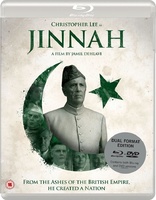
Movie rating
6.9 | / 10 |
Blu-ray rating
| Users | 0.0 | |
| Reviewer | 3.0 | |
| Overall | 3.0 |
Overview
Jinnah (1998)
An epic biopic about the life of Muhammad Ali Jinnah (Christopher Lee), the man who created the Muslim nation of Pakistan in the wake of Great Britain’s relinquishment of control over India. After his death in 1948, Jinnah awaits final judgement in the afterlife and must tell the story of his life, before celestial bureaucrats decide his fate. Covering the political strife and bloody events that led to the formation of Pakistan, Jinnah is an intelligent and moving piece of cinema, with a performance by Sir Christopher Lee that he personally believed to be the finest of his career.
Starring: Christopher Lee, Shashi Kapoor, James Fox, Christopher Godwin, Indira VarmaDirector: Jamil Dehlavi
Specifications
Video
Video codec: MPEG-4 AVC
Video resolution: 1080p
Aspect ratio: 1.85:1
Original aspect ratio: 1.85:1
Audio
English: LPCM 2.0 (48kHz, 16-bit)
1536 kbps
Subtitles
English SDH
Discs
Blu-ray Disc
Two-disc set (1 BD, 1 DVD)
DVD copy
Playback
Region B (locked)
Review
Rating summary
| Movie | 3.5 | |
| Video | 3.5 | |
| Audio | 3.5 | |
| Extras | 0.0 | |
| Overall | 3.0 |
Jinnah Blu-ray Movie Review
Reviewed by Dr. Stephen Larson January 31, 2018Jamil Dehlavi's JINNAH (1998) has been released as a Blu-ray/DVD combo courtesy of UK label Eureka Entertainment. There are no extras on either disc. The movie contains mostly English dialogue with some spoken Urdu and comes with optional English SDH. Region "B" locked.
Most fans of world cinema know Mohammad Ali Jinnah, founder of Pakistan, through Gandhi (1982). (He was played by Alyque Padamsee in Richard Attenborough's sweeping biopic of the Indian leader.) They may be surprised to learn that Pakistani filmmaker Jamil Dehlavi's produced a modestly budgeted biopic of Jinnah starring Christopher Lee in the title role back in the late nineties. The project engendered controversy from the beginning. While it had full support from the Pakistani government, both Pakistanis and Brits were apparently up in arms about speculation that Jeremy Irons was going to "black up" before playing Jinnah. According to The Guardian, Irons was never approached about playing the central role. Suzanne Goldenberg, a writer for The Guardian, reported that the prospective film also mounted major concern because it might "sanitise the secular Jinnah to suit Pakistan's present day rulers, or rewrite the history of partition." When it was announced that Lee would portray Jinnah, there was a contingent of skeptics who didn't think that the British Hammer Horror veteran could convincingly pull off the man known as Quaid-i-Azam (Great Leader). While Jinnah wasn't a box-office success (except maybe in Pakistan), critics gave it very good marks, including Lee's performance. Appearing at a press conference at the Brussels Fantastic Film Festival in 2002, Lee deemed it "by far the best thing I've ever done."
Scriptwriters Akbar Ahmed (a Jinnah biographer and Cambridge University Islamic scholar) and Dehlavi concoct a narrative structure that is at once familiar and a little unconventional. Like Gandhi, Jinnah begins with the imminent death of its subject. It is 1947 (shortly after partition) and a weak Jinnah (Christopher Lee) is transported into a car by his loving sister Fatima (Shireen Shah) and an entourage of family loyalists. The vehicle, however, has run out of petrol on the desert road, leaving the crew with few options to get the country's leader to a hospital. The film flash-forwards to the afterlife in a heavenly library where a scholarly guide (the recently departed Shashi Kapoor) has been showing a group of historians around. After they disperse, old Jinnah comes into the light to greet the "Narrator" (Kapoor). The latter explains that their is an intermediate problem with preserving Jinnah's legacy because all of documents inside the historical ledger are still being transferred to hard-drive disks where they'll be uploaded to a computer. The PC's main frame in the library hasn't received them yet and its up to the spiritual Jinnah and the Narrator to reconstruct them. The pair go into a darkened theater and watch vintage newsreels of Jinnah, which segues into a series of flashbacks.
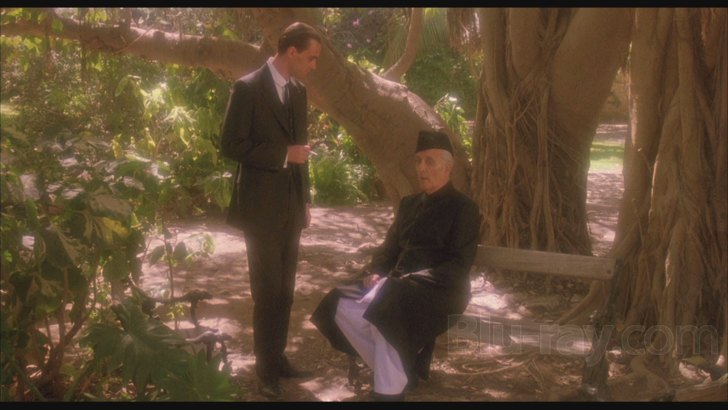
Young and old Jinnah converse.
Although these kind of narrative devices have been done before, the ones chosen by Ahmed and Dehlavi are effective because it permits the audience to see how a wise and learned Jinnah in the afterlife looks back at the decisions his younger self made in hindsight and retrospect. The Narrator and Jinnah enter the world of flashbacks, with the latter even appearing with his middle-aged self (whose played by Richard Lintern) as the two discuss how to make a peaceful compromise with others on splitting up India and Pakistan. The movie shows the transformation Jinnah made—as a proponent of Indian independence from British rule and advocate of Hindu/Muslim unification. In later years, Jinnah had peaceful disagreements with his political adversaries, principally Mahatma Gandhi (Sam Dastor) and Nehru (Robert Ashby), about creating a separate nation for Pakistan. He also quibbled with the British Governor General Mountbatten (James Fox) who sought to expediently get the Brits out of India. Jinnah also deals with the titular subject's engagement and marriage to a seventeen-year-old girl from the Parsee's faith. Jinnah was then a forty-two-year-old Islamic barrister and this caused an uproar, especially with the girl's father as shown in the film.
There are several moments in the 110-minute feature where I thought certain scenes could have been better developed or played out more. But as a whole, Jinnah delivers a compelling and multifaceted portrait of an important leader whose been largely neglected in history books. Lee gives a commanding performance in the lead and his booming voice lends an aura of authority. In press accounts of the film, Dehlavi stated that he spoke to contemporaries of Jinnah: i.e., Englishmen who saw the Great Leader in 1947 and attested that he appeared as a "very tan Englishman" to them. Lee captures that look well. James Fox delivers as excellent performance but it's not one of his more challenging roles. As Mountbatten, he's playing a dignified gentleman with a duplicitous agenda that's really a variation of his Lord Darlington in Merchant Ivory's The Remains of the Day. Sam Dastor is fine as Gandhi as is Robert Ashby portraying Nehru. But neither are the caliber of Ben Kinglesly and Roshan Seth but I don't think that Dehlavi intended them to stand out as much in this film as they do in Attenborough's work. The rest of the cast is good and production aspects are of high quality.
Jinnah Blu-ray Movie, Video Quality 
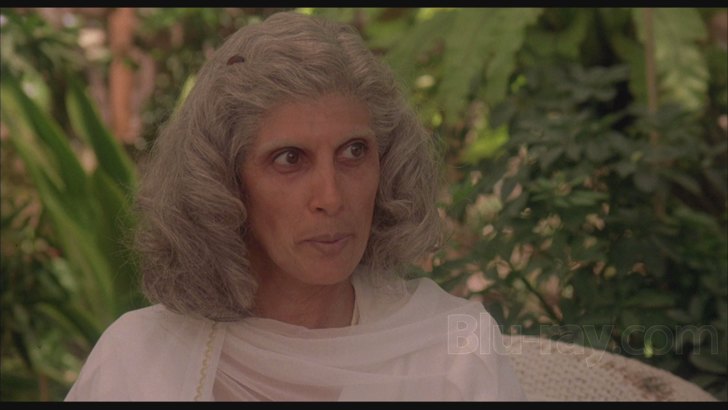
Jinnah makes its global debut on high-definition on this dual-format Blu-ray/DVD. The movie appears in the aspect ratio of 1.85:1 (mimicking its intended theatrical exhibition) on this MPEG-4 AVC-encoded BD-25. Authoring is okay on the Blu-ray (an average video bitrate of 28000 kbps). Jinnah is a rather hard video transfer to judge because of the shifting lighting schemes. Flashbacks have a misty and diffused look to them with edge halos that I believe are deliberately present in the frame. The film often boasts a coarse grain structure and DNR and is almost non-existent. There are occasional speckles, which crop up around the mosquito net surrounding Jinnah's bed. The film has been remastered/restored since the two-disc "Collector's Edition" UK-based label GVI put out in 2004. At the end of the credits, there is a copyright date of 2015 along with Jamil Dehlavi's name, which suggests that he must have had some say about the transfer. GVI's NTSC DVD stretched the film to 2.35:1 anamorphic widescreen and worked from various prints. According to Mark Boydell of the then-DVD Times, "the source material for the DVD was incredibly difficult to source given the legal wranglings that still surround the film so obviously the print has not received a deluxe Hollywood treatment and has had to be sourced from different prints. Some scenes also suffered from poor lighting and were difficult to enhance without creating edge enhancement....[the disc's technical authors] worked from some very poor source materials." The Eureka image is a substantial improvement, sporting much superior contrast and color correction.
Eureka provides eleven chapter stops but there is no "scene selection" on the main menu. You have to access the chapter markers on your remote.
Jinnah Blu-ray Movie, Audio Quality 
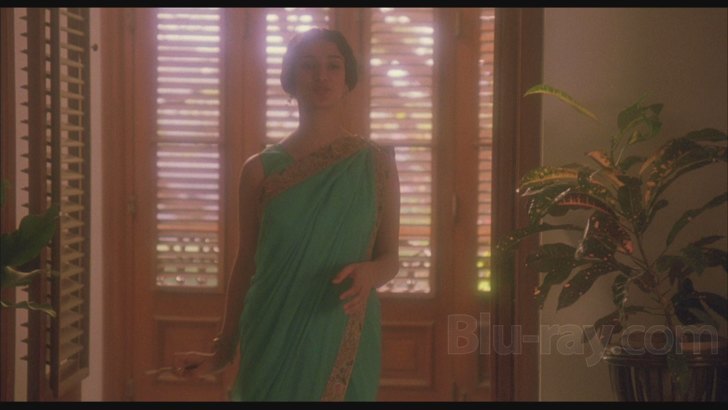
Eureka delivers an English LPCM 2.0 Stereo sound track (1536 kbps, 16-bit) that is free from source flaws and distortions. English is primarily the spoken language, although there is some Urdu too. The optional English SDH translated the latter during one scene but not for another that I tested. Dialogue hovers around the center speaker and is generally clear and audible. Crowd noise during the riot scenes supplied some nice ambiance in the fronts. The musical score by Nigel Clarke and Michael Csányi-Wills is competently presented. GVI had an English Dolby Digital 5.1 Surround mix and an Urdu Dolby Digital 5.1 dub on its DVD so a 5.1 alternative would have been appreciated here.
Jinnah Blu-ray Movie, Special Features and Extras 
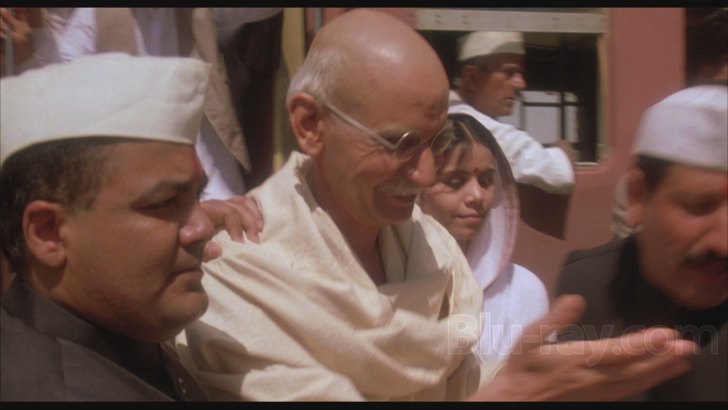
Eureka's Blu-ray barely has a menu and there are no bonus features. GVI had several an audio commentary with actor Christopher Lee, executive producer Dr. Nasim Ashraf, DVD producers Mohammad Khokhar and Saeedullah Khan Paracha; a 44-minute making-of doc; an EPK featurette; a 23-minute featurette on the music; a music video by Junoon; and a brief interview. Jinnah is a budget release by Eureka but I wish they would have made an effort to license the extras from this long OOP and ultra-rare DVD package.
Jinnah Blu-ray Movie, Overall Score and Recommendation 
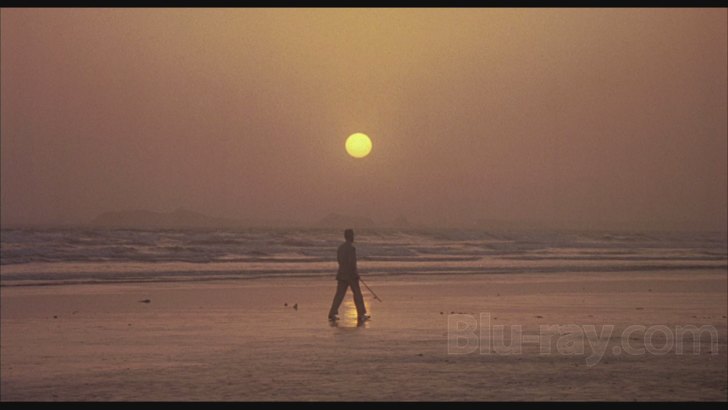
While no means a complete and definite account of Mohammad Ali Jinnah's life personal life and political career, Jamil Dehlavi's Jinnah is a beautifully mounted biopic led by Christopher Lee's towering performance. The film is dopey in parts and its scene compressions likely elide some historical truths. The ensemble cast is uniformly solid. Eureka boasts a much improved video transfer over the DVD released fourteen years ago, although it still contains some flaws. The package would be more complete if Eureka had ported over at least three of the double disc's supplements. Still, Lee makes the film worth seeing and the Blu-ray earns a RECOMMENDATION.
Similar titles
Similar titles you might also like
(Still not reliable for this title)

The Boss of It All
Direktřren for det hele
2006

The Last of the Unjust
Le dernier des injustes / Masters of Cinema
2013

The Story of Film: An Odyssey
2011

Successive Slidings of Pleasure
Glissements progressifs du plaisir
1974

Norte, the End of History
Norte, hangganan ng kasaysayan
2013

The Brigand of Kandahar
Indicator Series
1965

A New Leaf
Masters of Cinema
1971

Rio das Mortes
1971

Go West Young Man
1936

Shoah: The Four Sisters
Shoah: Four Sisters / Les quatre soeurs | The Hippocratic Oath / The Merry Flea / Baluty / Noah's Ark | Masters of Cinema
2018

Smiles of a Summer Night
Sommarnattens leende
1955

Schick After Shave
1971

Enys Men
2022

Powaqqatsi
Arrow Academy
1988

The Gardener
باغبان / Bāghbān
2012

The Silence
سکوت / Sokout
1998

Deep Cover
1992

Kustom Kar Kommandos
1970

Around the World with Orson Welles
1955

Buster Keaton: The Saphead
Masters of Cinema
1920
